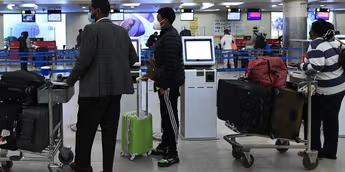Tracking H-1B Visa Trends: Top 10 African Nations Sending Skilled Workers to the U.S.
The H-1B visa program has long served as a gateway for skilled foreign professionals to work in the United States. While India and China traditionally dominate H-1B numbers, Africa is emerging as a significant contributor, particularly in sectors like technology, healthcare, engineering, and research.
🌍 Africa’s Growing Presence in the U.S. Skilled Workforce
In recent years, African countries have steadily increased their representation among H-1B applicants and beneficiaries. Engineers, data scientists, academics, and healthcare professionals from across the continent are becoming an essential part of the U.S. tech and STEM talent pool.
This trend reflects Africa’s rising education standards, growing tech hubs, and the global demand for specialized skills.
💸 New H-1B Fee May Reshape Global Talent Migration
Earlier this month, President Donald Trump signed a proclamation imposing a $100,000 fee on all new H-1B petitions submitted after September 21, 2025. While the policy doesn’t affect current visa holders or renewals, it’s expected to dampen employer enthusiasm for sponsoring new foreign workers.
Key Impacts:
- Designed to combat abuse of the H-1B system.
- Aims to prioritize American employment.
- Could discourage hiring from abroad, especially from emerging markets like Africa.
The White House justified the decision by highlighting wage suppression tactics and the need to better regulate access to STEM jobs—a sector where African professionals are increasingly active.
🌍 What This Means for African Skilled Workers
For many African professionals, particularly those from countries with less-established diaspora networks, the new policy presents a tougher path forward.
Key Concerns:
- Higher costs could reduce corporate sponsorships.
- Consulting and tech firms may turn to other countries or local talent pools.
- Smaller African economies may feel the impact most acutely.
These shifts could significantly influence African migration trends, as aspiring professionals look for alternative global opportunities or face increased competition for U.S.-based roles.
📊 Top 10 African Countries by H-1B Visa Approvals (FY 2024)
According to the Fiscal Year 2024 Annual Report to Congress (October 2023 – September 2024), here are the top African countries with the most H-1B approvals:
| Country | Approved Petitions | % of Total |
|---|---|---|
| 🇳🇬 Nigeria | 2,275 | 0.6% |
| 🇬🇭 Ghana | 984 | 0.2% |
| 🇪🇬 Egypt | 817 | 0.2% |
| 🇰🇪 Kenya | 559 | 0.1% |
| 🇿🇦 South Africa | 423 | 0.1% |
| 🇪🇹 Ethiopia | 317 | <0.1% |
| 🇨🇲 Cameroon | 289 | <0.1% |
| 🇺🇬 Uganda | 273 | <0.1% |
| 🇹🇿 Tanzania | 251 | <0.1% |
| 🇿🇼 Zimbabwe | 205 | <0.1% |
Together, these countries represent the core of Africa’s H-1B presence, with Nigeria clearly leading the charge.
🔮 What’s Next for Africa’s Tech and STEM Talent?
Despite the new policy hurdles, the global demand for tech and STEM talent remains strong. African professionals are likely to continue pursuing opportunities abroad, including:
- Remote international roles
- Education-to-employment pathways
- Global tech startups and innovation hubs within Africa
However, the $100,000 petition fee may lead to a redistribution of global talent pipelines, possibly pushing skilled Africans toward Canada, the UK, Europe, or Gulf countries where immigration policies are more accessible.
🧠 Final Thoughts
The H-1B visa remains a symbol of aspiration for many African professionals. However, recent policy changes in the U.S. may force both employers and applicants to rethink their strategies.
As Africa continues to develop world-class talent, it’s crucial for international systems to balance regulation with inclusion, ensuring that opportunity remains open to those with the skills to make a global impact.
Solomon Ekanem
Editor at Business Insider Africa, specializing in African development and global economic trends.



